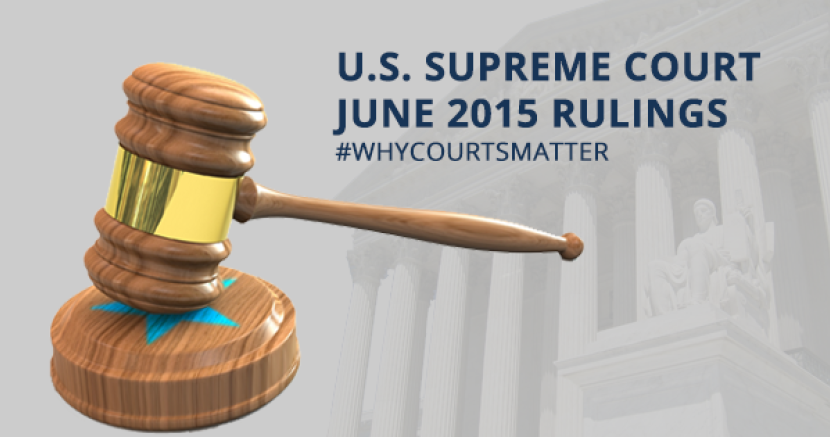Ed. Note: the following is Part 5 of our 5-part SCOTUS 2015 series reviewing decisions from this summer.
Every American has the freedom to marry the person they love. This is why courts matter.
It was a long, hard-fought legal battle which many hoped would be over in 2013 when the Supreme Court struck down the Defense of Marriage Act. But now, it's official, as the decision of Obergefell v. Hodges means the fight for marriage equality is over.
The case, which rendered bans on same-sex marriage unconstitutional, was part of a group of cases from federal district and circuit courts around the country where judges routinely struck down state bans wherever the cases were heard. People rejoiced that the Supreme Court refused to stay the rulings of these lower courts - but the final test came down to the recent ruling. The waiting game continued.
On June 26th, 2015, the waiting ended, and the nation was flung into a chaotic jubilee.
In the landmark 5-4 decision Justices Anthony Kennedy, Ruth Bader Ginsburg, Elena Kagan, Sonia Sotomayor, and Stephen Breyer provided the majority opinion - with Chief Justice John Roberts joining Justices Samuel Alito, Antonin Scalia, and Clarence Thomas in dissent.
The majority opinion, written by Justice Kennedy, focused on the fact that equal protection under the law meant that States could not discriminate against same-sex couples in their desire to marry. In an extremely eloquent manner, Kennedy finished his opinion with this already legendary closing:
“No union is more profound than marriage, for it embodies the highest ideals of love, fidelity, devotion, sacrifice, and family. In forming a marital union, two people become something greater than once they were. As some of the petitioners in these cases demonstrate, marriage embodies a love that may endure even past death. It would misunderstand these men and women to say they disrespect the idea of marriage. Their plea is that they do respect it, respect it so deeply that they seek to find its fulfillment for themselves. Their hope is not to be condemned to live in loneliness, excluded from one of civilization’s oldest institutions. They ask for equal dignity in the eyes of the law. The Constitution grants them that right.”
Meanwhile - for the dissent - Chief Justice Roberts' used a different tone.
Roberts focused solely on a states' rights viewing of the cases. Roberts saw the majority's opinion as an instance where the judicial branch went too far beyond the legislative branch of government. Here is an excerpt from his opinion:
“Understand well what this dissent is about: It is not about whether, in my judgment, the institution of marriage should be changed to include same-sex couples. It is instead about whether, in our democratic republic, that decision should rest with the people acting through their elected representatives, or with five lawyers who happen to hold commissions authorizing them to resolve legal disputes according to law.”
So what's next?
The right for same-sex couples to marry has been solidified, but with 29 states lacking equal protection ordinances for members of the LGBT community, the question of equality under the law is definitely not resolved.
There will be more legal battles along the way to make sure that this issue is addressed - but for now, it's time to celebrate.
Check out the posts below for more on our 5-part SCOTUS 2015 series reviewing this summer's rulings:
DONATE
Your donation supports our media and helps us keep it free of ads and paywalls.









